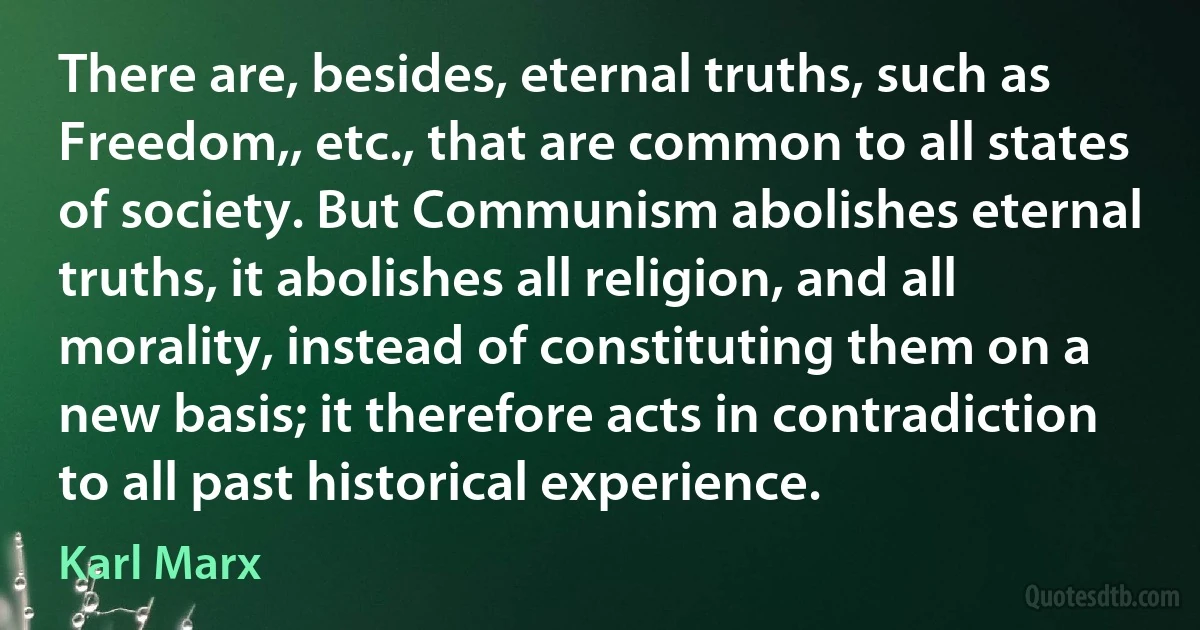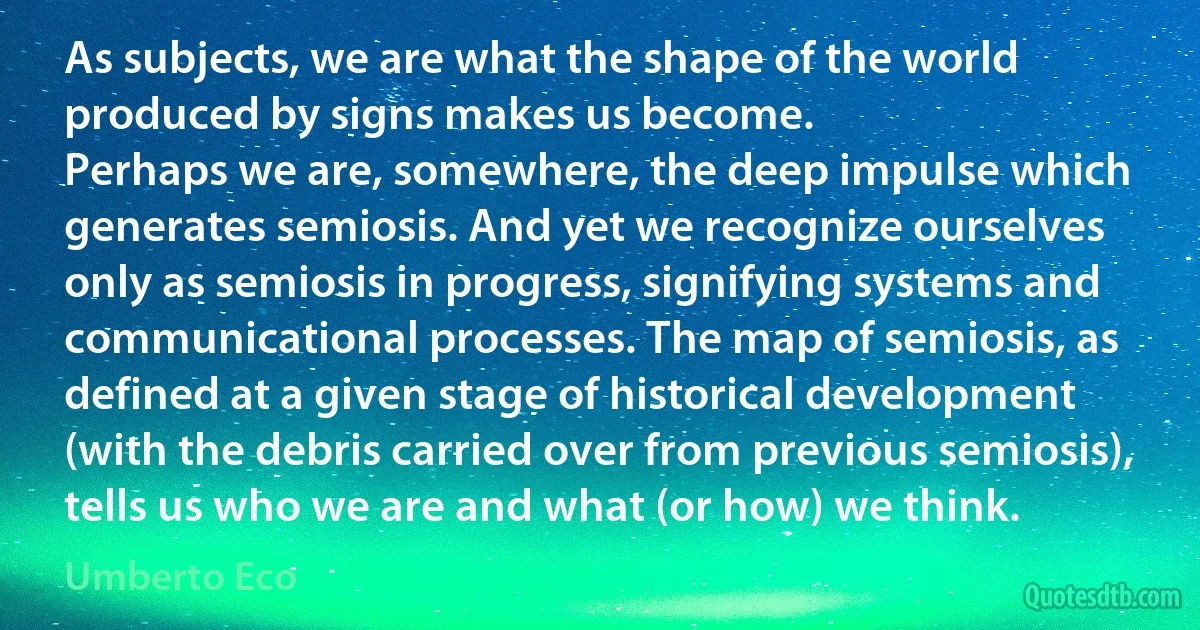Historical Quotes - page 43
As in private life one differentiates between what a man thinks and says of himself and what he really is and does, so in historical struggles one must still more distinguish the language and the imaginary aspirations of parties from their real organism and their real interests, their conception of themselves from their reality.

Karl Marx
Biology is the scientific study of life - in principle, anyway. In practice, biology is the scientific study of life on Earth based on carbon-chain chemistry. There is nothing in its charter that restricts biology to carbon-based life; it is simply that this is the only kind of life that has been available to study. Thus, theoretical biology has long faced the fundamental obstacle that it is impossible to derive general principles from single examples... Without other examples, it is difficult to distinguish essential properties of life - properties that would be shared by any living system - from properties that may be incidental to life in principle, but which happen to be universal to life on Earth due solely to a combination of local historical accident and common genetic descent.

Chris Langton
I would not hesitate to say I was addicted to the Internet in the first two years. It can be addictive, and things not taken in moderation have negative effects. But the alarmism around 'Facebook is changing our brains' strikes me as a kind of historical trick. Because we now know from brain science that everything changes our brains.

Clay Shirky
I have sought with some touches of detail to bring out the solidarity and historical continuity of the High Intelligentsia of England, who have built up the foundations of our thought in the two and a half centuries, since Locke, in his Essay Concerning Human Understanding, wrote the first modern English book.

John Maynard Keynes
[Philistines] only devised the notion of an epigone-age in order to secure peace for themselves, and to be able to reject all the efforts of disturbing innovators summarily as the work of epigones. With the view of ensuring their own tranquility, these smug ones even appropriated history, and sought to transform all sciences that threatened to disturb their wretched ease into branches of history. ... No, in their desire to acquire an historical grasp of everything, stultification became the sole aim of these philosophical admirers of "nil admirari.” While professing to hate every form of fanaticism and intolerance, what they really hated, at bottom, was the dominating genius and the tyranny of the real claims of culture.

Friedrich Nietzsche
But the parallels go further, Greeks, Jews, and Armenians after their subordination to others and emigration or expulsion from their original homelands became Diaspora ethno-religious communities cultivating the particular virtues and aptitudes of their traditions. These included a respect for scholarship and learning, derived from constant study of sacred texts (and in the Greek case some of their ancient secular texts seen through religious filters); and hence a generally high status accorded to religious scholars and clergy within each enclave. Allied to this was a marked aptitude for literary expression-poetic, philosophical, legal, liturgical, linguistic, and historical.

Anthony D. Smith
And so Benet's opening description of Daniel Webster might have foretold Arizona U.S. senator John McCain, who fashioned himself a would-be president, once adored for his anti-establishmentarian streak and revered for his personal Vietnam War POW sacrifices. John McCain could have been Daniel Webster in dissuading misguided Americans from electing a fraudulent, dissembling, and America-loathing Barack Obama. Instead, John McCain ran an inept, cowardly, and deliberately underwhelming presidential campaign in 2008. McCain was AWOL on the campaign stump just eight weeks before election day. He squandered a respectable résumé, settling for a historical annotation as a ballot placeholder, enabling eight years of progressive and race-hustling hell. John McCain, unwilling to confront Barack Obama's elaborate deceptions and racial animus, surrendering to the nation's infatuation with identity politics, was scorned and rejected, shunted aside for a darling nobody.

John McCain
We no longer have to search for a name for the post-Cold War era. It will henceforth be known as the age of terrorism. Organized terror has shown what it can do; execute the single greatest massacre in American history, shut down the greatest power on the globe and send its leaders into underground shelters. All this, without even resorting to chemical, biological or nuclear weapons of mass destruction. This is a formidable enemy. To dismiss it as a bunch of cowards perpetrating senseless acts of violence is complacent nonsense. People willing to kill thousands of innocents while they kill themselves are not cowards. They are deadly, vicious warriors and need to be treated as such. Nor are their acts of violence senseless. They have a very specific aim: to avenge alleged historical wrongs and to bring the great American satan to its knees.

Charles Krauthammer
Frederick the Great (1712-1786) once asked his personal physician, Dr. Zimmermann, "Can you name me a single proof of the existence of God?" Zimmermann replied, "Your Majesty, the Jews!" By that he meant that if one wanted to ask for a proof of God, for something visible and tangible, that no one could contest, which is unfolded before the eyes of all men, then we should have to turn to the Jews. Quite simply, there they are to the present day. Hundreds of little nations in the Near East... have dissolved and disappeared in the huge sea of nations; [only] this one tiny nation has maintained itself.... If the question of a proof of God is raised, one need merely point to this simple historical fact. For in the person of the Jew there stands before our eyes the witness of God's covenant with Abraham, Isaac, and Jacob, and in that way with us all. Even one who does not understand Holy Scripture can see this reminder.

Karl Barth
President Ho Chi Minh, understanding the extraordinary historical importance and the consequences of the glorious October Revolution, and assimilating Lenin's luminous thought, saw clearly that in Marxism-Leninism we could find the teaching and the path that had to be followed to find a solution to the problem of the peoples oppressed by colonialism.

Fidel Castro
During the year just past there came to this country from across the sea a man - a leader of men. He was a tall man, clear of eye, imposing in stature and lofty in mien who had met and wrestled with this "greatest scourge of mankind" and who understands fully the determining concepts and the motivating forces of international Communism. He shapes his every utterance, act and deed in consonance with this understanding. He is a man of such broad vision and knowledge that the Atlantic Ocean becomes merely a peaceful lake, although enclosed by the shores of continents, and the broad Pacific, a benign moat but on which can be carried the thriving commerce of billions of men. This man has such a knowledge of the historical past and such an insight into a divinely ordained future that he fashions the deeds of today to mesh with a tomorrow of one thousand years from now. This man is known to the world as General of the Army Douglas MacArthur.

Douglas MacArthur
If the findings of historical criticism are right, then some kinds of theological claims are certainly to be judged as inadequate and wrong-headed. It would be impossible, I should think, to argue that the Bible is a unified whole, inerrant in all its parts, inspired by God in every way. It can't be that. There are too many divergences, discrepancies, contradictions; too many alternative ways of looking at the same issue, alternatives that often are at odds with one another. The Bible is not a unity, it is a massive plurality. God did not write the Bible, people did.

Bart D. Ehrman
A storyteller who made up an account about Jesus in order to prove a point may well have known that he was passing off a fiction as a historical event. A scribe who wanted a text to say something other than what it did may well have changed the text for just that reason. In some cases it is hard to imagine how else the resultant deception could have come about. Whoever added the final twelve verses of Mark did not do so by a mere slip of the pen.

Bart D. Ehrman
What is a symbol? Etymologically speaking, the word σύμβολον comes from σνμβάλλω, to throw-with, to make something coincide with something else: a symbol was originally an identification mark made up of two halves of a coin or of a medal. Two halves of the same thing, either one standing for the other, both becoming, however, fully effective only when they matched to make up, again, the original whole. ... in the original concept of symbol, there is the suggestion of a final recomposition. Etymologies, however, do not necessarily tell the truth - or, at least, they tell the truth, in terms of historical, not of structural, semantics. What is frequently appreciated in many so-called symbols is exactly their vagueness, their openness, their fruitful ineffectiveness to express a 'final' meaning, so that with symbols and by symbols one indicates what is always beyond one's reach.

Umberto Eco
It was a real science; it had discovered there among the contingency and disorder, some valid general principles of evolution-development, adaptation, complexification, and many more specific principles as well, confirmed by the various subdisciplines.
What he needed were similar principles influencing human history. The little reading he did in historiography was not encouraging; it was either a sad imitation of the scientific method, or art pure and simple. About every decade a new historical explanation revised all that had come before, but clearly revisionism held pleasures that had nothing to do with the actual justice of the case being made.

Kim Stanley Robinson
An experiment was in progress to ascertain if ordinary culture had attained a stage at which it would appreciate a flood of new thought relating to a science loftier than any dealing exclusively with phenomena perceptible to the physical senses, and in connection with that experiment I was privileged to receive a considerable volume of information relating to the early history of mankind millions of years antedating the range of historical record; also to the concatenation of worlds and the ultimate destinies of our own. Though crude and incomplete, this preliminary sketch of occult science and of the agency through which, though unknown to the multitude, the purpose of creation was being worked out on the physical plane, thrilled the readers of the message all over the civilized world to an extent which gave rise to an organization, the Theosophical Society, which now covers Great Britain, Europe generally, and the United States of America with innumerable branches.

Alfred Percy Sinnett



